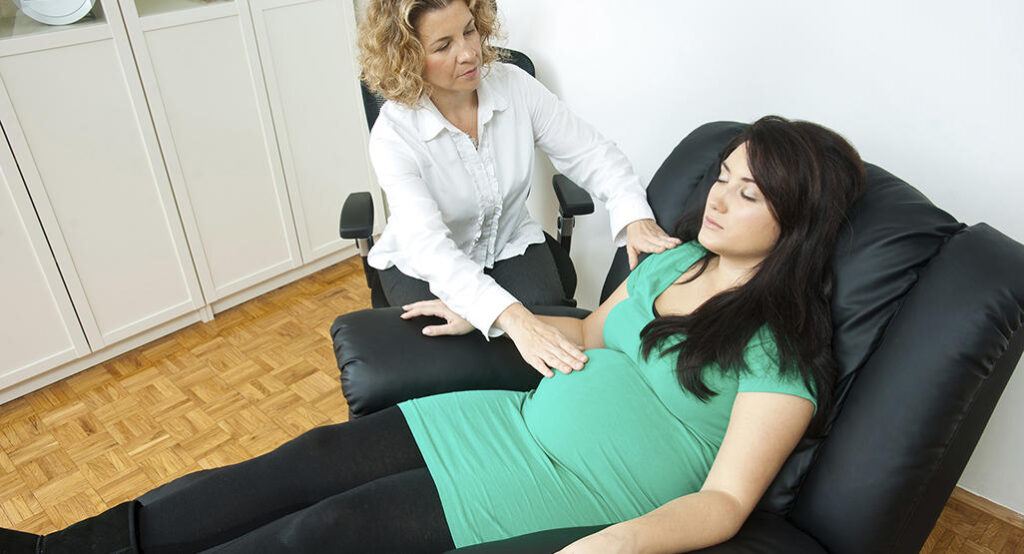Hypnosis For Childbirth

Incredibly, there is a way to reduce anxiety during pregnancy, experience comfortable childbirth without any pain medication and minimise the risk of post-natal depression. And it’s available to every single mother-to-be at minimal cost.
Surprised? Well you may be even more surprised to discover that it’s not a new development but a simple therapy that has been around for centuries. This miracle cure for all the modern-day trials of childbirth was pioneered by Dr Grantly Dick-Read, the founder of the National Childbirth Trust no less. He was a leading proponent of the use of hypnotherapy in labour when he wrote ‘Childbirth Without Fear’, originally published in 1933.
Inspired by the good doctor, the HypnoBirthing movement gathered pace in the US in the latter part of the 20th century. Created by hypnotherapist Marie Mongan, it provides a structured training programme for practitioners as well as books and CDs offering practical advice and information for expectant parents.
Extensive research, mainly in the US but including some small studies in the UK, demonstrates without exception the many benefits of hypnosis in childbirth. Despite this and the fact that there are a growing number of hypnotherapists trained to support maternity services, HypnoBirthing is not available within the NHS.
Midwives in Scotland who dipped into their own pockets to pay for hypnotherapy training earned numerous testimonials from happy parents for their trouble. But, as is the case with the majority of alternatives to drug-centred treatment, the medical establishment is reluctant to acknowledge hypnotherapy as a valid treatment for any kind of condition. And this is even though a study conducted back in the 1950s gave it sufficient credibility for the BMA to recommend that hypnosis techniques should be taught to all medical students. Needless to say, the recommendation was never taken up.
However, the National Childbirth Trust is a testament to parent power, proving that sizeable numbers of us would prefer to keep medical intervention in childbirth to a minimum using safe, simple, tried and tested methods. On the whole, our heroic midwives support this aim and we are fortunate indeed to have all the technology NHS budgets can afford to provide life-saving treatment when things don’t go to plan. That said, if you do a straw poll of any number of mums in your acquaintance you’ll find an unsettling number pale at the memory of their labour and, if pressed, will reveal something traumatic about the birth of their cherished little ones.
In fact, I’d describe my own two experiences of childbirth as harrowing to say the least and believe they would have been very different if I had the knowledge I have since gained as a clinical hypnotherapist.
So let me explain how hypnotherapy helps mother and baby, making the job easier for attending midwives and ultimately reducing complications and subsequent costs. Dr Dick-Read rejected the need for pain relieving drugs during childbirth on the grounds that pain was principally a product of preconceived fear and tension. He called it the ‘fear-tension-pain’ syndrome and believed that women who were properly prepared could control labour pain themselves without having to resort to medication.
Our innate fear of childbirth is a belief derived from cultural conditioning. There are non-westernised cultures where it is considered normal for babies to be delivered without pain. But, for us, the term ‘labour’ automatically conjures up thoughts of pain and struggle. And we relate hospitals to sickness and death, not life.
So, two evocative negative images already exist deep within our psyche, in the subconscious, where thoughts and beliefs gathered through a lifetime are deeply embedded. It is this part of the mind where hypnosis does its work and where hypnotherapy can begin to transform the birth experience by dislodging negative conditioning.
Contrary to popular belief and a mystique cultivated by stage performers, hypnosis is no more extraordinary an experience than day-dreaming. It is a trance-like state between waking and sleeping which we frequently go into quite naturally during the course of a day. What is exceptional about hypnosis is that it enables us to access the subconscious part of our brain and change our way of thinking through imagery and suggestion.
We cannot consciously ‘unthink’ long held beliefs any more than we can learn not to read any more. We cannot, through sheer force of willpower, decide not to feel pain. But hypnosis enables us to overcome fears and focus our attention away from pain to a degree that makes it possible to block it out completely.
This is powerful stuff so it’s worth stating loudly that no-one can be hypnotised against their will or be forced whilst under hypnosis to behave or think in a way they do not wish to. The act of becoming hypnotised is, in effect, self-hypnosis, whether induced by a therapist, by listening to a CD or simply by relaxing and using well-practiced techniques. This alone reduces tension and creates a feeling of well-being and calm.
Ante-natal hypnotherapy sessions enable pregnant women to fine tune this natural ability. With the guidance of a clinician, anyone can learn to use what is described as the ‘hypnoreflexogenous protocol’ to create a ‘conditioned reflex’. Put simply, it is possible through hypnosis to prepare emotionally to remain in control of and respond confidently to the physical process of childbirth. So, women giving birth can overcome the ‘fear-tension-pain’ syndrome using self hypnosis to achieve the best possible outcome in their given circumstances. There are even examples of caesarean sections being carried out using hypnosis alone as anaesthetic. But this is at the extreme end of the spectrum of uses of hypnosis because of the degree of preparation required for a patient to undergo any kind of surgery in this manner.
All you have to do is Google ‘HypnoBirthing’ or ‘hypnosis and childbirth’ and you will find numerous clinical studies revealing to varying degrees, but nonetheless quite staggering, statistical success stories. Time after time you will find evidence of considerably shorter labours, particularly for primigravid women, with the first stage reduced by three hours or more. Typically, twice as many women using hypnosis require no pain medication and the majority delivery spontaneously without any surgical intervention. Interestingly, though perhaps not surprisingly, higher Apgar scores are recorded for ‘hypnobabies’.
What is clear from research findings is that hypnosis is a safe and effective way to decrease the perception of pain whilst increasing your ability to manage the sensations of labour. With plenty of practice, it is possible for some women to use self hypnosis to eliminate pain completely and experience only pressure during contractions. While not all of us can achieve this, we are all capable of decreasing our perception of pain and increasing our coping skills. When tense, anxious or frightened, our bodies create a ‘fight or flight’ response.
Animal research shows that, if threatened by predators, mammals will flood their bodies with ‘fight or flight’ chemicals to stop labour so they can get themselves and their babies to safety. This was also demonstrated during the Blitz when it was noted that women in labour would stop when air raid sirens went off only to start again after the raid was over. In a normal environment, the ‘fear-tension-pain’ syndrome can create the same response, leading to prolonged labour, greater foetal distress and lower Apgar scores.
Conversely, self hypnosis creates a state of deep relaxation whilst fully aware, totally relaxed and in control. It generates feel-good endorphins, making it possible to maintain energy levels throughout the physically demanding process of childbirth. And the benefits don’t stop there. Research reveals that mothers who deliver under hypnosis overwhelmingly report positive feedback on the whole experience. Complications are fewer and more pregnancies go to full-term. Partners are more engaged as they are involved in maintaining the right conditions for hypnosis to do its work and they do not have to experience seeing the mother of their child in extreme distress. Postpartum, these mums recover more quickly and are less susceptible to post natal depression.
Given all this evidence, it is my passionate belief that all parents-to-be should at least be made aware of the incredible power of hypnotherapy and have the opportunity to experience the advantages for themselves.





